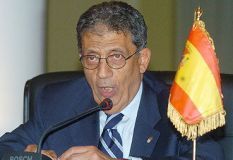Arab League chief to visit Sudan over Darfur crisis
Sept 30, 2006 (CAIRO) — The head of the Cairo-based Arab League will travel to Sudan on Monday for talks with Sudanese President Omar Hassan al-Bashir over war-ravaged Darfur, a League official said on Saturday.
 The trip by Secretary-General Amr Moussa comes amid a global diplomatic standoff over Darfur, where roughly 200,000 people have died and more than 2.5 million have been displaced since 2003 in fighting between rebels, government forces and militias.
The trip by Secretary-General Amr Moussa comes amid a global diplomatic standoff over Darfur, where roughly 200,000 people have died and more than 2.5 million have been displaced since 2003 in fighting between rebels, government forces and militias.
“He (Moussa) will be going to Sudan. He is leaving on Monday and coming back on Tuesday night. The purpose of the trip is to discuss issues pertaining to Darfur,” Hesham Youssef, an aide to Moussa, told Reuters.
Sudan is under heavy international pressure to allow a 20,000-strong U.N. peacekeeping force to replace 7,000 poorly funded, ill-equipped African Union troops tasked with monitoring a shaky ceasefire in west Sudan.
European Commission President Jose Manuel Barroso arrived in Sudan on Saturday to try to convince Khartoum to let in the peacekeepers.
Arab diplomats have said that Egypt and the Arab League, of which Sudan is a member, were trying to persuade Khartoum to accept a U.N. Security Council resolution that proposes sending U.N. troops to Darfur to restore law and order.
They said they want Sudan to accept a U.N. deployment to avoid the kind of confrontation that led to the U.S. invasion of Iraq in 2003.
Bashir has so far refused to admit U.N. peacekeepers, likening them to an invasion force bent on regime change in Khartoum. Analysts say the Sudanese government is also worried that some officials could be arrested on war crimes charges.
The Arab League’s Youssef declined to specify what kind of message Moussa would deliver to Bashir, or whether he would try to exert any pressure on Sudan over U.N. forces.
Western leaders, some African presidents, and international humanitarian groups say a robust U.N. force is the only way to stem violence in Darfur. The mandate for African forces, extended earlier this month, expires at the end of the year.
But not all Arab countries have publicly joined the call for U.N. forces, with the 22-member Arab League labelling the U.N. Darfur resolution as “hasty”.
“It was taken in a hasty manner without adequate consultations … It could have been done in a much better way. But we have to see how we will deal with this issue,” Youssef said, adding that the Arab League believed U.N. resolutions should be respected in principle.
“So we have to see how we are going to deal with this Security Council resolution despite all what we see as shortcomings … We still have to deal with it.”
Egypt, which says any U.N. force must have the consent of the Khartoum government, blamed Darfur rebels on Thursday for insecurity in western Sudan.
But in an interview with the pan-Arab Asharq al-Awsat newspaper, Egypt’s Foreign Minister Ahmed Aboul Gheit also said Egypt was willing to send troops to Darfur to take part in a peacekeeping force “if Sudan wants that and accepts the presence of international forces on its land”.
(Reuters)
